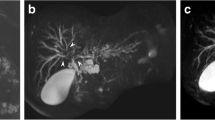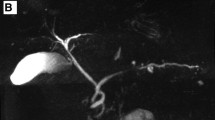Abstract
Objective
To compare the acquisition time, diagnostic efficacy, and image quality of the newer compressed SENSE 3D MRCP (CS-3D MRCP) with conventional 3D MRCP (C-3D MRCP) in children with pancreatitis.
Methods
A total of 24 children (2–17 y) diagnosed with pancreatitis were included in this study. The children underwent CS-3D MRCP and C-3D MRCP sequences. C-3D MRCP and CS-3D MRCP images were evaluated for the acquisition time duration, visualization of the pancreaticobiliary ducts, background suppression, image quality degradation by artifacts, and overall image quality by the two radiologists independently. Paired sample t-test was used to compare the acquisition time, the McNemar test for the image quality features, and the kappa coefficient was used for interobserver agreement.
Results
A two-fold decrease in the acquisition time of CS-3D MRCP (~148 ± 61 s) was seen, compared to C-3D MRCP (~310 ± 98 s), p < 0.001. The median scores for overall image quality on CS-3D MRCP and C-3D MRCP, respectively, were 2.05 ± 0.52 and 2.21 ± 0.53 (p = 0.18) for both radiologists. No significant difference was seen for the visibility of ducts, background suppression, and artifacts between the two radiologists, with substantial to almost perfect agreement seen for the different findings.
Conclusion
The application of compressed SENSE 3D MRCP in children with pancreatitis results in a two-fold reduction in acquisition time with acceptable image quality. This may help in reducing the need for long sedation in children requiring anesthesia support for the MRCP and potentially help in reducing motion artifacts.


Similar content being viewed by others
References
Anupindi SA, Victoria T. Magnetic resonance cholangiopancreatography: techniques and applications. Magn Reson Imaging Clin N Am. 2008;16:453–66.
Zhang J, Israel GM, Hecht EM, Krinsky GA, Babb JS, Lee VS. Isotropic 3D T2-weighted MR cholangiopancreatography with parallel imaging: feasibility study. AJR Am J Roentgenol. 2006;187:1564–70.
Kim JH, Hong SS, Eun HW, Han JK, Choi BI. Clinical usefulness of free-breathing navigator-triggered 3D MRCP in non-cooperative patients: comparison with conventional breath-hold 2D MRCP. Eur J Radiol. 2012;81:e513–8.
Feng L, Benkert T, Block KT, Sodickson DK, Otazo R, Chandarana H. Compressed sensing for body MRI. J Magn Reson Imaging. 2017;45:966–87.
Runge VM, Richter JK, Heverhagen JT. Speed in clinical magnetic resonance. Invest Radiol. 2017;52:1–17.
Chavhan GB, Babyn PS, Manson D, Vidarsson L. Pediatric. MR cholangiopancreatography: principles, technique, and clinical applications. Radiographics. 2008;28:1951–62.
Marshall SP, Smith MS, Weinberger E. Perceived anxiety of pediatric patients to magnetic resonance. Clin Pediatr (Phila). 1995;34:59–60.
Tyc VL, Fairclough D, Fletcher B, Leigh L, Mulhern RK. Children’s distress during magnetic resonance imaging procedures. Child Health Care. 1995;24:5–19.
Schmidt MH, Marshall J, Downie J, Hadskis MR. Pediatric magnetic resonance research and the minimal-risk standard. IRB. 2011;33:1–6.
Everts R, Muri R, Leibundgut K, Siegwart V, Wiest R, Steinlin M. Fear and discomfort of children and adolescents during MRI: ethical consideration on research MRIs in children. Pediatr Res. 2022;91:720–3.
Malviya S, Voepel-Lewis T, Prochaska G, Tait AR. Prolonged recovery and delayed side effects of sedation for diagnostic imaging studies in children. Pediatrics. 2000;105:E42.
Lohöfer FK, Kaissis GA, Rasper M, et al. Magnetic resonance cholangiopancreatography at 3 Tesla: Image quality comparison between 3D compressed sensing and 2D single-shot acquisitions. Eur J Radiol. 2019;115:53–8.
Furlan A, Bayram E, Thangasamy S, Barley D, Dasyam A. Application of compressed sensing to 3D magnetic resonance cholangiopancreatography for the evaluation of pancreatic cystic lesions. Magn Reson Imaging. 2018;52:131–6.
Yoen H, Lee JM, Lee SM, et al. Comparisons between image quality and diagnostic performance of 2D- and breath-hold 3D magnetic resonance cholangiopancreatography at 3T. Eur Radiol. 2021;31:8399–407.
Yoon JH, Lee SM, Kang HJ, et al. Clinical feasibility of 3-dimensional magnetic resonance cholangiopancreatography using compressed sensing: comparison of image quality and diagnostic performance. Invest Radiol. 2017;52:612–9.
Sodhi KS, Khandelwal N, Saxena AK, et al. Rapid lung MRI in children with pulmonary infections: time to change our diagnostic algorithms. J Magn Reson Imaging. 2016;43:1196–206.
Zhu L, Wu X, Sun Z, et al. Compressed-sensing accelerated 3-dimensional magnetic resonance cholangiopancreatography: application in suspected pancreatic diseases. Invest Radiol. 2018;53:150–7.
Acknowledgements
The authors thank Dr Indrajit Saha and Mr. Rohit Mishra, Philips India Ltd. for hel** in optimizing the compressed SENSE sequence for MRCP. The authors also thank Mr. Kamaljeet and Ms. Kiran Gargya, Department of Radiodiagnosis and Imaging, PGIMER, Chandigarh, India for hel** in the acquisition of the cases.
Author information
Authors and Affiliations
Contributions
KSS made substantial contributions to the conception or design of the work; acquisition, analysis, and interpretation of data; drafted the work and revised it critically for important intellectual content; approved the version to be published; agree to be accountable for all aspects of the work in ensuring that questions related to the accuracy or integrity of any part of the work are appropriately investigated and resolved. MM made substantial contributions to the conception or design of the work; acquisition, analysis, and interpretation of data; drafted the work and revised it critically for important intellectual content; approved the version to be published. AB, SBL and AKS made substantial contributions to the analysis, and interpretation of data; revised the work critically for important intellectual content; approved the version to be published. KSS will act as the guarantor for this paper.
Corresponding author
Ethics declarations
Informed Consent
Informed written consent was obtained from the parents or guardians of all children included in the present study. Assent was also obtained from children aged 7 y and above.
Conflict of Interest
None.
Additional information
Publisher’s Note
Springer Nature remains neutral with regard to jurisdictional claims in published maps and institutional affiliations.
Kushaljit Singh Sodhi and Muniraju Maralakunte are joint first authors
Rights and permissions
Springer Nature or its licensor (e.g. a society or other partner) holds exclusive rights to this article under a publishing agreement with the author(s) or other rightsholder(s); author self-archiving of the accepted manuscript version of this article is solely governed by the terms of such publishing agreement and applicable law.
About this article
Cite this article
Sodhi, K.S., Maralakunte, M., Bhatia, A. et al. Utility of the New Faster Compressed SENSE MRCP at 3 Tesla MRI in Children with Pancreatitis. Indian J Pediatr 90, 1210–1215 (2023). https://doi.org/10.1007/s12098-022-04403-w
Received:
Accepted:
Published:
Issue Date:
DOI: https://doi.org/10.1007/s12098-022-04403-w




